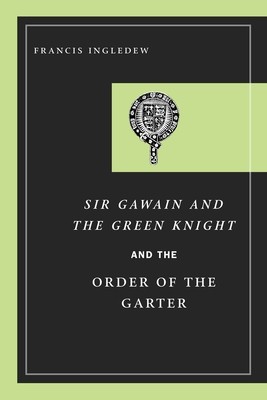
- Mēs nosūtīsim 10-14 darba dienu laikā.
- Autors: Francis Ingledew
- Izdevējs University of Notre Dame Press
- Gads: 2006
- Lapas: 320
- ISBN-10 : 0268099006
- ISBN-13 : 9780268099008
- Formāts: 15.2 x 22.9 x 1.9 cm, kieti viršeliai
- Valoda: Anglų
- Extra -10% atlaide, ievadot kodu: EXTRA
Sir Gawain and the Green Knight and the Order of the Garter + bezmaksas piegāde! | Bookbook.lv
Atsauksmes
Apraksts
Francis Ingledew's book makes the case that Sir Gawain and the Green Knight, one of the canonical works of medieval English literature, should be recognized as a response to King Edward III's foundation in 1349 of the chivalric Order of the Garter. As well as providing the basis for a thorough reinterpretation of the poem's purposes and meanings, this argument dates to the mid-fourteenth-century reign of Edward III (1327-77) a poem conventionally ascribed to the reign of Richard II (1377-99).
Through close readings of the poem and of an array of overlooked historical sources, Ingledew presents Sir Gawain and the Green Knight as a critique of Edward III's sexual and military behavior. Ingledew's argument takes him deep into chivalric practice in Edward's court of the 1340s, much of it connected with the early years of war with France. Ingledew pursues the significance of sexual scandal associated with Edward, especially the rape of the Countess of Salisbury confidently imputed to him by the formidable Liégois historian Jean le Bel. At the same time that he was trying to conquer France and Scotland and preside over a court vulnerable to scandal, Edward also called on the history (as it was seen) of King Arthur and the Round Table, associating himself with Arthur's imperial and moral authority through the founding of the Order of the Garter. In its portrayal of the Order of the Garter, Ingledew argues, Sir Gawain and the Green Knight sets itself at odds with Edward's central ethical and political projects.
A new and persuasive interpretation of a central literary text, this book will be of interest to medievalist historians as well as literary scholars.
10 EXTRA % atlaide
Kupona kods: EXTRA
Akcija beidzas 7d.00:07:11
Atlaides kods derīgs pirkumiem no 10 €. Atlaides nav kumulatīvas.
Derīgs tikai pirkumiem tiešsaistē.

- Autors: Francis Ingledew
- Izdevējs University of Notre Dame Press
- Gads: 2006
- Lapas: 320
- ISBN-10: 0268099006
- ISBN-13: 9780268099008
- Formāts 15.2 x 22.9 x 1.9 cm, kieti viršeliai
- Valoda: Anglų
Francis Ingledew's book makes the case that Sir Gawain and the Green Knight, one of the canonical works of medieval English literature, should be recognized as a response to King Edward III's foundation in 1349 of the chivalric Order of the Garter. As well as providing the basis for a thorough reinterpretation of the poem's purposes and meanings, this argument dates to the mid-fourteenth-century reign of Edward III (1327-77) a poem conventionally ascribed to the reign of Richard II (1377-99).
Through close readings of the poem and of an array of overlooked historical sources, Ingledew presents Sir Gawain and the Green Knight as a critique of Edward III's sexual and military behavior. Ingledew's argument takes him deep into chivalric practice in Edward's court of the 1340s, much of it connected with the early years of war with France. Ingledew pursues the significance of sexual scandal associated with Edward, especially the rape of the Countess of Salisbury confidently imputed to him by the formidable Liégois historian Jean le Bel. At the same time that he was trying to conquer France and Scotland and preside over a court vulnerable to scandal, Edward also called on the history (as it was seen) of King Arthur and the Round Table, associating himself with Arthur's imperial and moral authority through the founding of the Order of the Garter. In its portrayal of the Order of the Garter, Ingledew argues, Sir Gawain and the Green Knight sets itself at odds with Edward's central ethical and political projects.
A new and persuasive interpretation of a central literary text, this book will be of interest to medievalist historians as well as literary scholars.

Atsauksmes